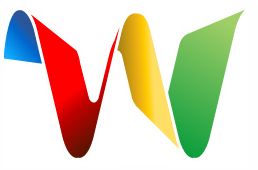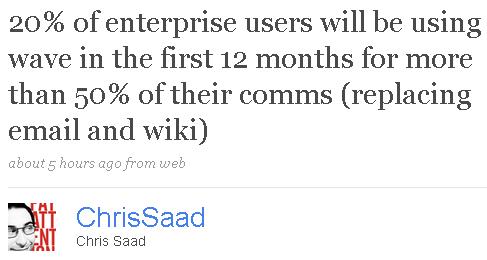 Chris Saad used to ask me questions about tech in enterprise due to my history (I’ve got the battle scars rolling out web2.0 at PwC), but he asked me after he wrote this post. So instead of telling him he’s wrong by email (ironic given the topic), I’m going to shame him to the world!
Chris Saad used to ask me questions about tech in enterprise due to my history (I’ve got the battle scars rolling out web2.0 at PwC), but he asked me after he wrote this post. So instead of telling him he’s wrong by email (ironic given the topic), I’m going to shame him to the world!
Why Google Wave will take over ten years to turn into a trending wave
As I previously wrote when the news of Google’s new technology was announced, there is a hidden detail Google hasn’t announced to the world: it requires massive computational power to pull off. It doesn’t take a brain to realise it either – anyone thats used a bloated Instant Messenger (like Lotus Same Time) probably understands this. All that rich media, group chat, real time – Jesus, how many fans are we going to need now to blow the steam generated by our computer processors? Mozilla pioneered tabbed browsing – and it’s still trying to pioneer on the same idea – from your computer crashing when you have more than a few tabs open!
Don’t get me wrong, Google Wave is phenomenal. But it’s only the beginning. The fact Google has opened this up to the world is a good thing. But we need to be realistic, because even if this technology is distributed (like how email is), the question I want to know is how many users can one server support? I’d be surprised at these early stages if it’s more than a dozen (the demo itself showed there’s still a lot of work to be done). Do I have inside knowledge? No – just common sense and experience with every other technology I’ve used to date.
Why Google Wave won’t hit the enterprise in the next 12 months
Now to the point where Saad is *really* wrong. “20% of enterprise users will be using wave in the first 12 months for more than 50% of their comms (replacing email and wiki)“.
Yeah right. It’s going to take at least three years, with a stable and mature technology, for this to work. Email sucks, but it also works. IT departments, especially in this economy, are not going to try a new form of communication that’s half working and is not a mass adopted technology (wiki’s are a new thing – there’s a cultural battle still being fought within enterprises).
The real time nature potentially might even scare communications departments. Entire divisions exist in firms like mine, to control the message sent to employees. If you are revealing a message before the final message has been crafted, you’ve given away control to that message – the process now becomes just as important as the final message. I understand this functionality can be turned off, but I’m raising it to highlight how enterprises think.
Google Wave rocks
Again, don’t get me wrong. Google Wave blows my mind. But let’s be realistic here – big ideas take time. It took a while for Google the search engine to domiante. Heck, Gmail has taken nearly a decade to get to the point of being called dominant. And you can fix bugs, deploy software, and roll out sales teams – but sometimes with big ideas, it’s a generational thing.
Wave will dominate our world communications – one day. But not for a while.

